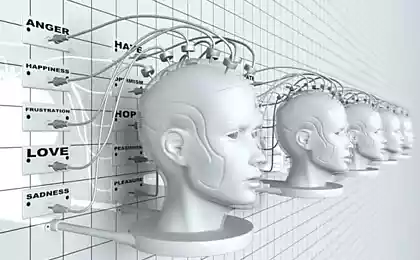704
Hidden methods of persuasion
How not to become a puppet? Do we control our minds? As established by David Robson, sow the idea in people's minds is surprisingly easy.
Our ability to make informed decisions rather illyuzornaRazve we all - dolls on strings? Most people would like to believe that they are free and their fate is in their own hands. But they are wrong. Often we are so helpless as a puppet, not noticing that we are under some subtle influence. We will execute them without even feeling it, and think it was our idea from the start.
Our ability to make informed decisions - often no more than an illusion. But to regain control is possible, if you know how to do it.

«We increasingly find that many of the decisions made under the influence of things that are not aware, - says Jay Olson from McGill University in Quebec, Canada, who recently conducted a brilliant experiment showing how we can be easily manipulated. - The question is, can we recognize these tricks, and how can we use them for our own benefit? »
Olson has devoted his life to studying the subtle ways to cheat people's perception, and it all started with magic. "I became interested in focus when I was five years, and in seven years I have been doing their workshop" - he says.
One card trick especially captured his imagination, and Olson took up the study. The essence of the focus of the following. It is necessary to shuffle the deck in front of the audience, and then asked to select a card at random. Then, one of the audience called the card and the magician took out of her pocket, much to the surprise of the crowd.
Other, apparently, is the delay of the selected map during paging card. (In our conversation Olson does not disclose how it does it). During these few extra milliseconds card is imprinted in the mind, resulting in a voluntarily chosen audience of all the cards of the deck.

Outside influence affects all without isklyucheniyaGlavnaya task Olson, a scientist, was to officially verify the success rate of the method. He already knew that the method is quite effective, but the results were truly stunning - Olson was able to send a variety of maps in 103 of the 105 participants in the experiment.
In spite of the feeling of freedom, , our ability to make informed decisions is often an illusion h4> Not surprisingly, it attracted media attention. But there was the next part of the study, in which Olson shows how easy it is to manipulate our minds.
Our ability to make informed decisions rather illyuzornaRazve we all - dolls on strings? Most people would like to believe that they are free and their fate is in their own hands. But they are wrong. Often we are so helpless as a puppet, not noticing that we are under some subtle influence. We will execute them without even feeling it, and think it was our idea from the start.
Our ability to make informed decisions - often no more than an illusion. But to regain control is possible, if you know how to do it.

«We increasingly find that many of the decisions made under the influence of things that are not aware, - says Jay Olson from McGill University in Quebec, Canada, who recently conducted a brilliant experiment showing how we can be easily manipulated. - The question is, can we recognize these tricks, and how can we use them for our own benefit? »
Olson has devoted his life to studying the subtle ways to cheat people's perception, and it all started with magic. "I became interested in focus when I was five years, and in seven years I have been doing their workshop" - he says.
One card trick especially captured his imagination, and Olson took up the study. The essence of the focus of the following. It is necessary to shuffle the deck in front of the audience, and then asked to select a card at random. Then, one of the audience called the card and the magician took out of her pocket, much to the surprise of the crowd.
Other, apparently, is the delay of the selected map during paging card. (In our conversation Olson does not disclose how it does it). During these few extra milliseconds card is imprinted in the mind, resulting in a voluntarily chosen audience of all the cards of the deck.

Outside influence affects all without isklyucheniyaGlavnaya task Olson, a scientist, was to officially verify the success rate of the method. He already knew that the method is quite effective, but the results were truly stunning - Olson was able to send a variety of maps in 103 of the 105 participants in the experiment.
In spite of the feeling of freedom, , our ability to make informed decisions is often an illusion h4> Not surprisingly, it attracted media attention. But there was the next part of the study, in which Olson shows how easy it is to manipulate our minds.
For example, when he later interviewed the volunteers, I was shocked to learn that 92% of volunteers absolutely not notice that they had been manipulated, and thought they were in full control of the decision making process. Even more surprisingly, that most went further, explaining imaginary reasons for their selection. One man said: "I chose ten of hearts, because the ten - a nice number and I thought of the worms before the experiment" - despite the fact that it took the decision for him Olson. Moreover, Olson found that things like the type of person does not have a noticeable impact on what you get for extraneous influence. We are all equally vulnerable.
The consequences go far beyond the tricks and should cause us to reconsider our understanding of his will. Despite the feeling of freedom, our ability to make informed decisions is often an illusion. "The feeling of freedom of choice has nothing to do with the decision itself," - says Olson.
Subtleties menyuNe believe? Then consider the case when you go to a restaurant to eat. Olson says that you are twice as likely to select dishes from the very top or the very bottom of the menu - because these areas in the first place our attention. "But if someone asks you why you chose the salmon, you answer that like to eat salmon, - says Olson - you do not say that it was one of the first items on the menu, which fell on your mind." In other words, we try to explain his choice, despite the fact that the selection was initiated restaurant.
Or how about a simple problem of choosing wine in a supermarket? Jennifer McKendrick and her colleagues from the University of Leicester found that the mere playing of the French or German background music led people to buy wines from these regions. When they were told about it, the subjects admitted that they did not notice this fact.
In the elections of 2000 in the United States Al Gore's supporters argued that Republicans stung word «RATS» («rat") in a leaflet with a picture of the representative of the Democrats.

Supporters Gore argued that a subliminal message about their candidate could sway voters. Replication poster with a fictional candidate, according to Drew Westen of Emory University, has shown that it really could hurt rating policy. It is doubtful that it could ever change the election results in the long term, but it is likely that other species such advertising has a certain effect on our behavior without our knowledge.
There is some evidence that anyone submitting a hot drink, you become a "warmer" in the eyes of others, and an unpleasant odor can make you treat people more severely.

How to identify manipulyatsiyuOchevidno that such knowledge can be used to enforce anything, so it pays to know how to identify an attempt to manipulate you without your knowledge.
The scientific literature indicates four basic manipulative steps to Watch.
1. Touch can be potent. Just slapping someone on the shoulder and looking into the eyes of the people show that they are much more open to suggestions.
This technique uses Olson during his tricks, but it also proved that the method works in a variety of everyday situations - such as urging people to lend you money.
2. The rate of speech. Olson said that magicians often try to literally speak volunteers, so they choose the first thing that comes to mind. But as soon as people have made their choice, magicians switch to a more relaxed way of speaking.
3. Be aware of the field of view. Pausing on the selected map, Olson makes it more "notable" that it is imprinted in the minds of volunteers, although they do not realize it.
There are many ways to get your attention - for example, product placement at eye level. For these reasons, we often end up choose the first of what we suggested.
4. Some questions may sow ideas. For example: "Why do you think it's a good idea?" Or, "What do you think about the benefits of this?" Manipulation seems obvious, but someone allows you to convince yourself of the correctness of its decision, and in the long term - that initially it was his idea.
All of us from time to time become puppets, obeying skilful influence on our mind. But if we learn to understand who is pulling the strings, then at least we can try to counter manipulators.
via www.bbc.com/future/story/20150324-the-hidden-tricks-of-persuasion
10 strange objects in the solar system, about which we know very little
"Seven flavors of Death": remember that people who have experienced clinical death


























